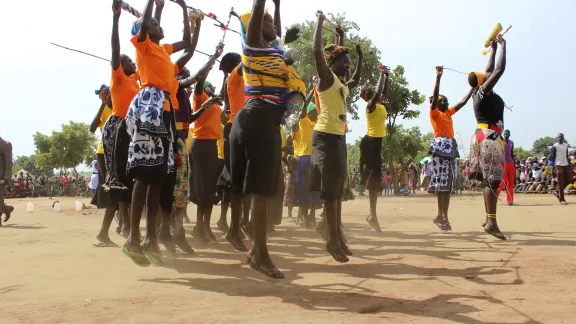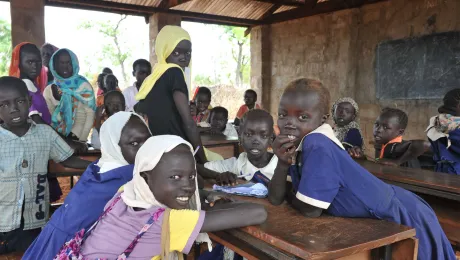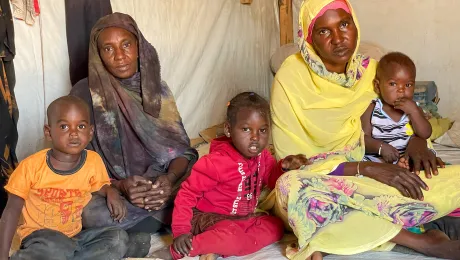
Adjumani World Refugee Day celebrations in Ayilo. Photo: LWF/ H. Lehto
World Refugee Day on 20 June 2015 was celebrated for over a week in the various Adjumani refugee settlements. The theme of this year is “Refugees: Ordinary people living through extraordinary circumstances. Get to know and support them”, reflecting on the fact that refugees are individuals with rights, people with stories, strengths and dreams of their own. According to the UN Refugee Agency (UNHCR), nearly 60 million people have fled their homes as refugees, internally displaced people or asylum seekers. It is a staggering number – equivalent to one in every 122 people on this planet.
Adjumani is a refugee settlement in northern Uganda, close to the South Sudanese border. It consists of various settlements named Dzaipi, Njumanzi and Ayilo, and hosts more than 70,000 people who fled the conflict in South Sudan. The Lutheran World Federation (LWF) was among the first to help the incoming refugees, and until now provides water, sanitation, livelihood and psychosocial support. Read here how refugees and hosts celebrated a day that is set up to raise awareness about their situation.
The main celebrations in Dzaipi on Saturday were honored by the Second Deputy Prime Minister of Uganda, the Hon. Moses Ali, among hundreds of guests enjoying the traditional dancing, marches and exhibitions of the partners, who have been responding to the humanitarian emergency resulting from the civil war in South Sudan since December 2013. The site, as the LWF Country Representative Jesse Kamstra noted in his speech, “is especially suitable; as you who responded to the emergency last year remember, this place hosted 27 000 new arrivals in the beginning”.
However, as the crowd took part in the celebrations, thousands of other refugees continued their daily chores in Adjumani. World Refugee Day also saw new arrivals of people displaced by conflict. They joined the ever growing population of people who cannot remain in their homes for fear of war, violence and starvation. Here are some of their stories.
Born a Refugee
On the dawn of World refugee Day, a yet nameless baby was born. Akeer, the 20-year old mother, delivered her first-born in the Nyumanzi Health Centre, which had been upgraded by LWF in May 2015 to serve the pregnant women with a maternity ward. Initially, the health center LWF constructed had just facilities for consultations, but now it caters also inpatients and people needing minor surgeries. For the newborn girl, home will be Block C, Nyumanzi Refugee Settlement. The tiny girl will not know the family home in Bor until peace has settled in South Sudan.
Her mother Akeer arrived and gave birth alone. The father does not know about the birth of his first-born daughter; he remained behind and Akeer does not know exactly where. “But I am happy, I gave birth to my daughter on this day, when they celebrate the World Refugee Day”, she smiles through her exhaustion.
In the next room to the delivery unit, Ajak feeds her daughter, who is the 5th child of this seasoned mother. “I know it is the World Refugee Day. I am looking forward to going back to my children, who are anxious to meet their new sister. They will all want to carry her around”, she tells me when asked how she will spend the day.
“We give them hope and safety, so that they would feel at home”
The LWF protection team introduces an extended family of 14 asylum seekers, who are being registered as refugees early on the World Refugee Day in Elegu, the border between northern Uganda and South Sudan. The Nuer family has arrived from Juba, after making the arduous journey from Bentiu in the north of South Sudan. Being a key town in South Sudan’s oil-producing Unity state, Bentiu has seen some of the worst fighting. UN reports speak of atrocities such as mass execution and rape, the town was bombed in February. The family travelled a distance of 1300 kilometers to safety.
Most of the extended family are children: Mary, herself a mother of 5, has taken in 4 foster children along the way who had lost their father in the war. As the 25-year old woman breastfeeds her 8 month old baby, the Office of the Prime Minister officials registers her and her family. After, she receives soap from one of the LWF protection team members. The LWF team also gives the new arrivals an introduction on what to expect, and about their entitlements in Uganda. Simon Drich, the Protection Team Field Extension worker, reassures the families of their newly found safety. “We work every day, during weekends and public holidays, we are there to receive the refugees, and to orient them to their new home. The arrivals never argue. They listen to us, because they know that we are there to protect them”.
“We want to talk about our experiences, and also about our achievements”
Back in Nyumanzi, Jacob Achiek presents his shop named Zungu-Wut (The Cowboy), which was set up with the financial support from LWF Uganda. The shop thrives, as Jacob strives to meet the demands of his customers. When asked what he most enjoys in the World Refugee Day events, the passionate coach of the refugee football team mentions football matches, as well as the wrestling, which he explains is “a way for unity, for different sub-tribes to get to know each other. It is culturally really important rite for our tribe, the Dinka. The peace building efforts are so crucial. ”
Achok Thuch, one of the refugee incentive workers for LWF in Adjumani, is excited about the dances that are enacted by various Dinka tribes as well as the local Acholis, honouring their heritage. But most of all, she likes the theme of the World Refugee Day this year, highlighting that ‘Refugees are people like anyone else, like you and me’.
“The event is a great opportunity to interact with the UN and the agencies, to let them know that their work is appreciated, and to tell them also about the challenges of refugee life. I want to hear, and tell stories. I have my own story, and I want to tell it. I want my ideas to be heard.”


